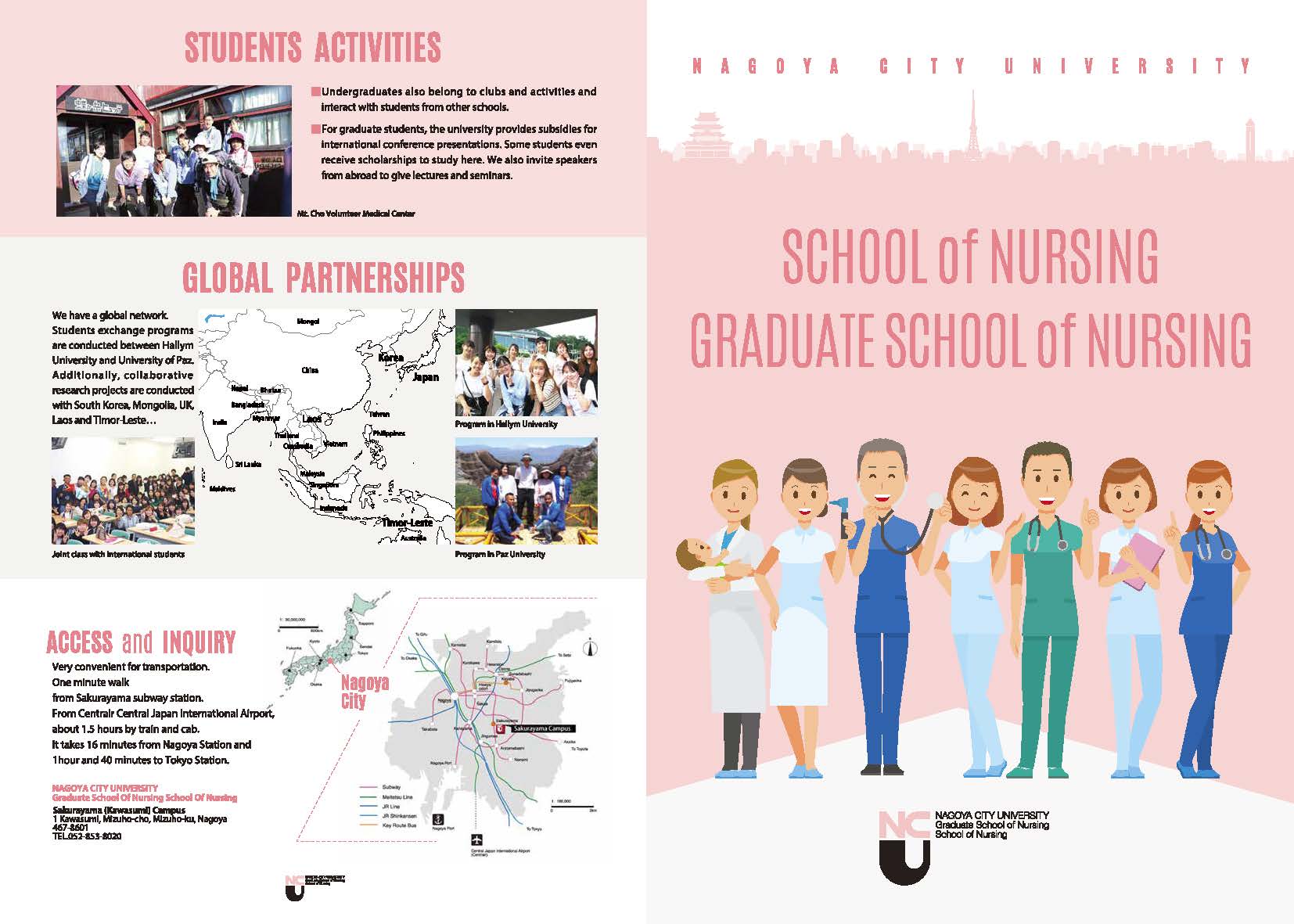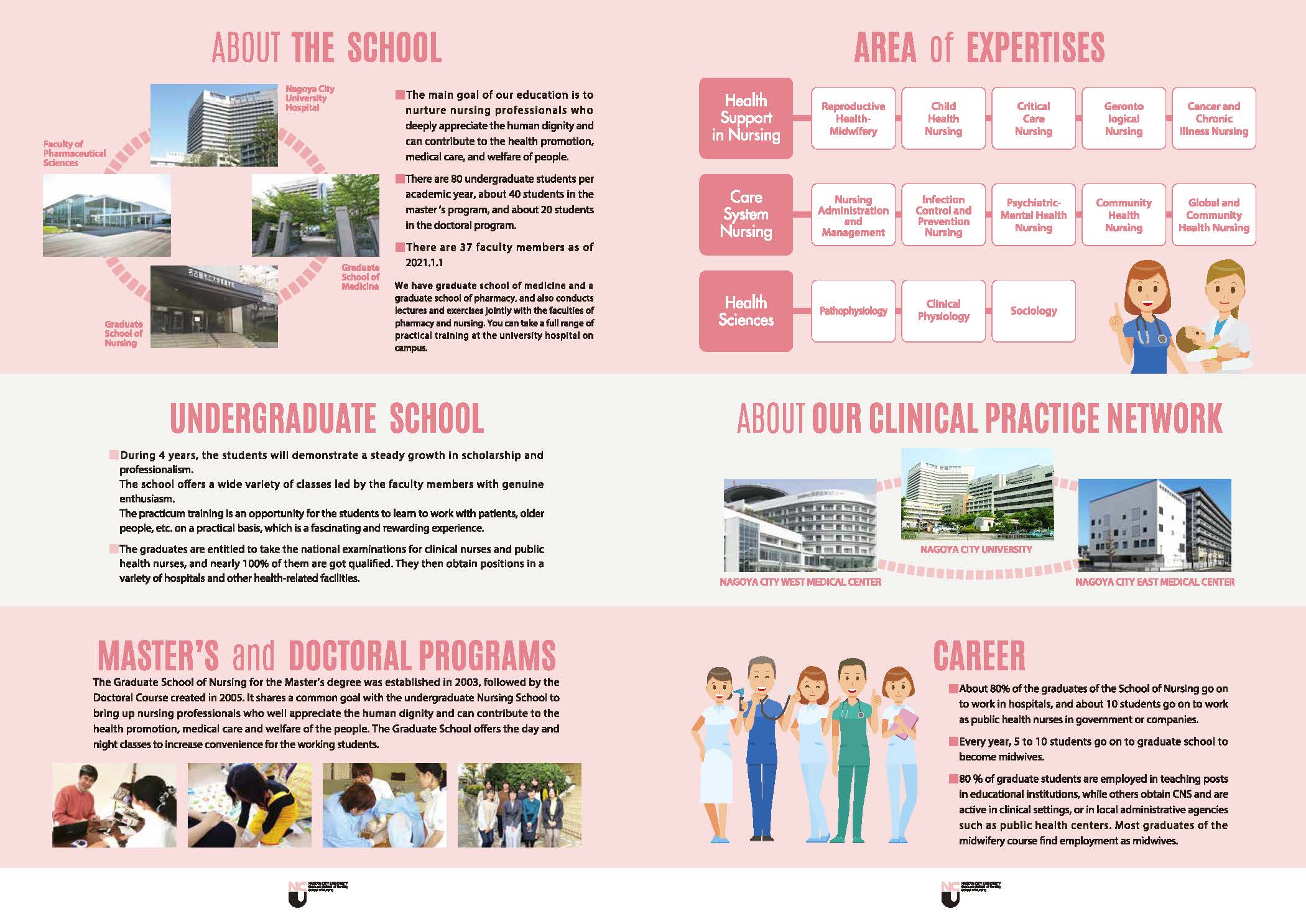About the School
Introduction of Graduate School of Nursing, Nagoya City University. English leaflet is below!!
Nursing empowers people to be healthy, and nurses are expected to assist people in learning to take responsibility for their own health and to make decisions about their lifestyle. In response to such social needs of advanced nursing, the School of Nursing was established in April 1999 as the 6th School of Nagoya City University.
The main goal of our education program has been set to bring up nursing professionals who well appreciate the human dignity and can contribute to the health promotion, medical care, and welfare of the people. To accomplish this, our curriculum aims for nurturing following four properties: (1) well-rounded education and rich humanity, (2) scientifically based judgment and power of execution in response to a variety of social changes, (3) capability to coordinate medical care with patients and other medical professions, and (4) competency to consider human health taking a broad view of things from local to international issues.
During four years in undergraduate course, the students will show a steady growth in scholarship and professionalism. The school offers a wide variety of classes led by the faculty members with genuine enthusiasm. The practicum training is an opportunity for the students to learn to work with patients, elderly persons, etc. on a practical basis, which is a fascinating and rewarding experience. The graduates are entitled to take the national examinations for clinical nurses and for public health nurses, and nearly 100% of them are qualified. They then obtain positions in a variety of hospitals and other health-related facilities. Although training midwives had been conducted as a part of the undergraduate education, we transfered it into the postgraduate education in 2008 because of the growing social demand for well-trained midwives.
The Graduate School of Nursing for the Master's degree was established in 2003, followed by the Doctoral Course created in 2005. It shares with the undergraduate Nursing School a common goal to bring up nursing professionals who well appreciate the human dignity and can contribute to the health promotion, medical care and welfare of the people. The Graduate School offers the day and night courses to increase convenience for the working students.
The main goal of our education program has been set to bring up nursing professionals who well appreciate the human dignity and can contribute to the health promotion, medical care, and welfare of the people. To accomplish this, our curriculum aims for nurturing following four properties: (1) well-rounded education and rich humanity, (2) scientifically based judgment and power of execution in response to a variety of social changes, (3) capability to coordinate medical care with patients and other medical professions, and (4) competency to consider human health taking a broad view of things from local to international issues.
During four years in undergraduate course, the students will show a steady growth in scholarship and professionalism. The school offers a wide variety of classes led by the faculty members with genuine enthusiasm. The practicum training is an opportunity for the students to learn to work with patients, elderly persons, etc. on a practical basis, which is a fascinating and rewarding experience. The graduates are entitled to take the national examinations for clinical nurses and for public health nurses, and nearly 100% of them are qualified. They then obtain positions in a variety of hospitals and other health-related facilities. Although training midwives had been conducted as a part of the undergraduate education, we transfered it into the postgraduate education in 2008 because of the growing social demand for well-trained midwives.
The Graduate School of Nursing for the Master's degree was established in 2003, followed by the Doctoral Course created in 2005. It shares with the undergraduate Nursing School a common goal to bring up nursing professionals who well appreciate the human dignity and can contribute to the health promotion, medical care and welfare of the people. The Graduate School offers the day and night courses to increase convenience for the working students.



